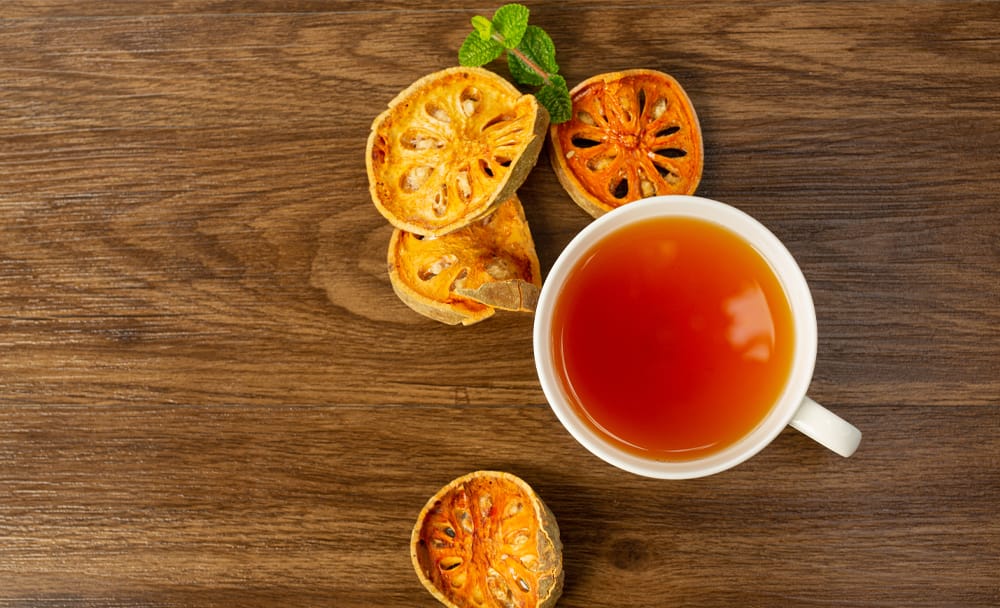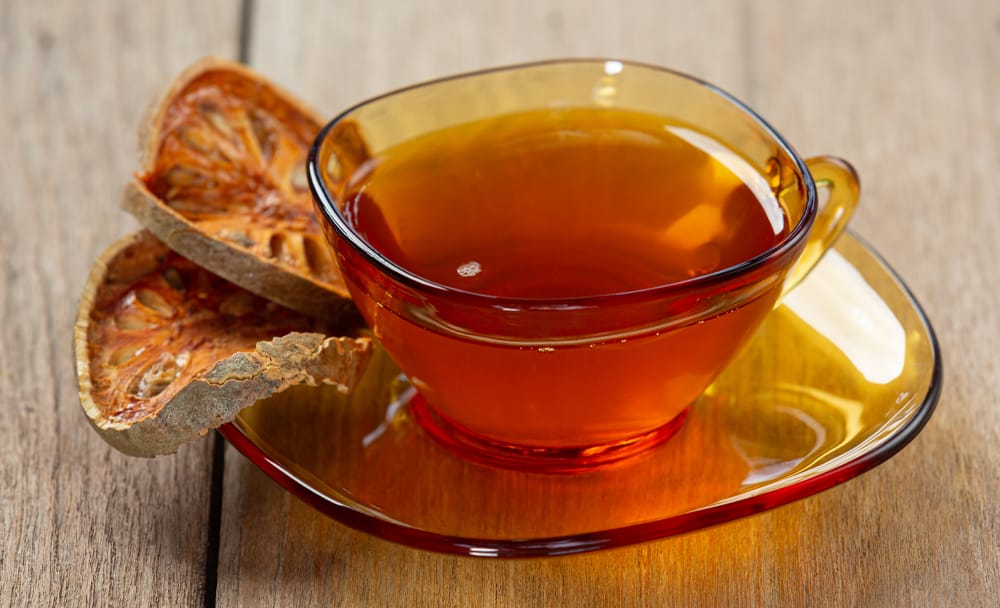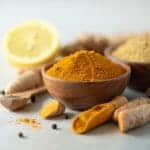
Wood apple, also known as Bael or Bilva, is an Ayurvedic fruit that offers a myriad of health benefits to the body. It is scientifically termed Aegle marmelos and is known to exhibit antioxidative, anti-inflammatory and laxative properties.
The benefits of wood apple fruit are immense. It is rich in various nutrients such as vitamin C, vitamin B1, vitamin B2, calcium, potassium, dietary fibres, good fats, etc. and is highly effective in the treatment of many lifestyle disorders. However, the most popular and effective wood apple benefits or Bael lies in boosting your digestive health.
Nutritional Value of Wood Apple [1]
(per 100gm edible pulp)
|
Constituents |
Pulp |
Seed |
|
Moisture |
74.0% |
4.0% |
|
Protein |
8.00% |
26.18% |
|
Fat |
1.45% |
27% |
|
Carbohydrates |
7.45% |
35.49% |
|
Ash |
5.0% |
5.03% |
|
Calcium |
0.17% |
1.58% |
|
Phosphorus |
0.08% |
1.43% |
|
Iron |
0.07% |
0.03% |
|
Tannins |
1.03% |
0.08% |
What are the Ayurvedic Properties of Wood Apple?
According to Ayurveda, the wood apple fruit has Katu (pungent), Tikta (bitter) and Kashaya (astringent) taste. It exhibits a hot potency and tends to aggravate the Pitta Dosha. However, wood apples are highly beneficial in pacifying Vata and Kapha Dosha in the body.
How Does Wood Apple Help Boost Your Digestive System?

Wood apples not only help to improve digestion but also treat and prevent various gastrointestinal disorders. The following benefits of wood apple make it a highly beneficial fruit for the digestive system.
- Packed With Dietary Fibres:
Wood apple is rich in dietary fibres, which are essential to regulate bowel movement in the body. It helps to prevent both constipation and loose stools.
- Prevents Constipation:
The laxative properties of the wood apple help to improve bowel movements and clean the intestines. Bael juice is known to be one of the best home remedies for treating constipation.
- Helps Treats Stomach Ulcers:
Wood apples are known to have excellent therapeutic powers for treating stomach ulcers. The fruit contains high levels of tannins that form a protective mucilage coating on the stomach mucosa. It obstructs excess stomach acid, which could otherwise induce inflammation and pain.
- Relieves Gas and Bloating:
Wood apple is also known to reduce gas, bloating and gastrointestinal discomfort. It helps to prevent indigestion, constipation and other gastrointestinal problems that may cause gastritis.
- Cures Hemorrhoids:
Wood apple is a natural laxative and also contains tannin, an anti-inflammatory agent. Therefore, it is highly beneficial in treating haemorrhoids or piles.
- Stops Diarrhoea:
Wood apples are highly beneficial in treating chronic diarrhoea. It is rich in tannins and exhibits antibacterial and antiparasitic properties which help to fight against shigellosis, the infection that causes diarrhoea.
What are the Other Benefits of Wood Apple?
- Blood Sugar Management
The wood apple fruit has a low glycemic index which helps to control blood sugar levels. It also contains Feronia gum which helps to regulate the production of insulin in the body. Therefore, it is considered highly effective in the management of type 2 diabetes.
- Scurvy Treatment
Rich in vitamin C, wood apples are also highly beneficial in the treatment of scurvy which is caused due to a deficiency of vitamin C in the body.
- Ear Health Enhancement
The antibacterial properties of wood apples also help treat infections in the ear and remove solidified wax from the ears, thereby improving ear health.
- Heart Health Support
Wood apples also help to lower the levels of cholesterol in the body and boost heart health. Moreover, it is rich in antioxidants that further help in the treatment of various heart ailments.
- Blood Purification and Immunity Boost
It is rich in potassium and can help purify the blood. Additionally, it helps to remove harmful toxins from the body and boost immunity.
- Respiratory Health Improvement
The anti-inflammatory, antibiotic and anti-asthmatic properties of wood apples help to treat common cold, cough, flu, bronchitis and asthma.
- Scalp and Hair Infection Treatment
Wood apple is also rich in anti-microbial properties that help treat scalp and hair infections like folliculitis, itching and dandruff.
- Skin Health [2]
Wood apple benefits for skin have been known for a very long time. Traditionally, the stem bark of a wood apple is mixed with water and applied mainly to the face. It is believed that regular application on the skin helps to keep skin cool, smooth, fair and well-textured complexion. It is also known to be protecting against skin cancer by blocking UV rays.
How to use Wood Apple?

- Wood apple or Bael can be used in the form of powder, decoctions, capsules or tablets. Depending on your medical condition, your Ayurvedic doctor will recommend the right method and dosage.
- You may also use wood apples for culinary purposes. You may make Chutney or Sherbet from the wood apple and have it during summers. The best way to use wood apples for boosting digestion is by making juice or Sherbet from the fruit.
How to Make Bael Sherbet?
- Wash 3-4 medium-sized wood apples and crack open their hard shell using a rolling pin.
- Scoop out the pulp from the fruits in a bowl and add 1 cup of water.
- Mash the pulp until it becomes semi-fluid.
- Now, strain the mixture to remove any solid unmashed pulp.
- Now, add 4 cups of chilled milk/ chilled water, 12 teaspoons of jaggery powder, one tablespoon of cardamom powder and one tablespoon of black salt to the pulp.
- Mix all the ingredients well, and your wood apple Sherbet is ready.
Wood Apple Side Effects and Precautions
- As the fruit helps lower blood sugar levels, overconsumption of wood apples may cause your blood sugar levels to drop extremely low.
- Wood apples have high levels of tannins. Therefore, excessive consumption of the fruit without consulting a doctor may cause your body to exhibit carcinogenic activities.
- Wood apples in pregnancy should be avoided as the leaves of the wood apple can be extremely harmful for pregnant and lactating women. Therefore, always consult a doctor before consuming wood apples in pregnancy.
- Although wood apple boosts digestion, overconsumption of the fruit may cause stomach problems and constipation as it is loaded with carbohydrates.
Takeaway
Wood apples are one of the best fruits for your digestive system. It helps to alleviate constipation, gas, bloating and stomach ulcers. Rich in dietary fibers, it boosts your overall digestion. Wood apple juice benefits are plenty, it not only pacifies Vata and Kapha Dosha in the body but also provides skin benefits such as treating skin rashes and protecting skin from harmful UV rays.
FAQs
- What are the benefits of wood apple juice?
Medicinal uses of wood apples are plenty. Wood apple juice is used to treat certain cardiac problems, it provides relief from sore throat, chronic cough, purifies blood and and is also used as a liver tonic. [3]
- Is it safe to consume wood apples during pregnancy?
Wood apples can cause harmful health effects to pregnant and lactating mothers. Hence, it is advisable for expecting mothers to avoid the consumption of wood apples. [4]
- Is a wood apple good for diabetes?
Wood apple is considered to be anti-hyperglycemic and antidiabetic. Being a fruit with a low glycemic index, it has a minimal impact on blood sugar levels. It may also help in managing diabetes by regulating blood sugar levels. [5]
- Is a wood apple good for health?
According to Ayurveda, wood apple, or bael, has several health advantages. Because of its fiber, antioxidant, and immune-boosting qualities, it promotes reproductive health, helps with digestion, improves skin health, reduces symptoms of asthma, strengthens the immune system, and helps control diabetes. [4]
- What are the other names of Wood Apple?
Wood apple resembles an apple and the name wood apple is due to the fruit’s hard shell. The fruit is also known as elephant apple, monkey fruit, or crud fruit. Other names of wood apple are as follows: [6] [7]
|
Language |
Name |
|
English |
Bengali Quince, Wood Apple |
|
Hindi |
Bel |
|
Bengali |
Bel, Shreefal |
|
Marathi |
Bel, Kaveeth |
|
Sanskrit |
Shreephal, Bilwa |
|
Gujarati |
Bil |
|
Telugu |
Bilwamu, Maredu |
|
Kashmiri |
Bel |
|
Oriya |
Belo |
Disclaimer
The information provided here is for general information and is not meant to substitute any medical advice. Please consult your doctor for appropriate medical consultation.
References
- Value Addition to Arid Fruits for Nutrition and Livelihood Dheeraj Singh, M Chaudhary, M L Meena and Chandan Kumar
- Wood Apple (Limonia Acidissima L.): A Multipurpose Herb In Cosmetics Vishakha Bagul, Sonal Dhabekar, Disha Sansarode, Sneha Dandekar. July 2019
- Nutraceutical Importance of an Underutilized Wood Apple Fruit. September 2022. Ashok Yadav, Sandeep Garg, Satyam Bansal
- Wood apple- Its nutritive value and medicinal benefits Tripti Yadav, Deepak Vishwakarma, Shweta Saloni, Soumitra Tiwari and Sindhu. 2018
- Wood apple: An underutilized miracle fruit of India. January 2020. The Pharma Innovation 9(10):198-202. Satya Vart Dwivedi, Nidhika Thakur, Vishal Chugh.
- Wood Apple—Limonia acidissima. Exotic Guide. Reference Guide. 2018
- https://www.researchgate.net/figure/Vernacular-names-of-bael-in-various-languages_tbl1_347873577















